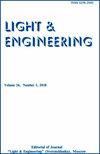LED灯的能量参数及特性研究结果
IF 0.3
4区 工程技术
Q4 ENGINEERING, ELECTRICAL & ELECTRONIC
引用次数: 0
摘要
基于发光二极管(LED)的照明系统解决方案,特别是LED灯,由于其高可靠性,能效,长寿命和降低成本而变得越来越受欢迎。同时,现代半导体照明设备既可能成为电磁干扰源,又可能对其敏感。LED灯的制造商提供了一些能量参数和特性,可以在设计阶段评估灯和电网之间的相互作用,但在某些情况下,所提供的指标范围并不能完全证明选择基于LED的解决方案是合理的。本文对LED灯的电磁兼容性问题进行了研究。LED灯作为非线性元件,会对电网产生电磁干扰。首先,它们发出电流谐波,是无功功率的消费者。本文参考了俄罗斯和国外规范LED灯的能量参数和特性的文件。结果表明,LED灯的数据表不能完全反映其能量参数和特性。本文在实验和分析研究的基础上,提出了评估LED灯各种能量参数和特性的方法和途径。特别关注光闪烁问题:显示了对人体健康产生负面影响的光通量频率范围,并给出了评估闪烁的方法。通过对几种LED灯的研究,得出了其能量参数和特性的广泛分布,特别是功率因数和闪烁。本文对基于LED灯具的照明系统设计中产品的选择提出了建议。本文章由计算机程序翻译,如有差异,请以英文原文为准。
Results of Research into Energy Parameters and Characteristics of LED Lamps
Light emitting diode (LED) based solutions for lighting systems, particularly LED lamps, are becoming increasingly more popular due to their high reliability, energy efficiency, long lifetime, and decreasing cost. At the same time, modern semiconductor lighting equipment can be both a source of electromagnetic interference and sensitive to it. Manufacturers of LED lamps provide a few energy parameters and characteristics that make it possible to assess the interaction between the lamp and the electrical network at the design stage, but in some cases, the range of indicators provided does not fully justify the selection of LED-based solutions. The issues of electromagnetic compatibility of LED lamps are considered in the paper. LED lamps, as non-linear elements, are shown to create electromagnetic interference for the electrical network. First, emitting current harmonics, they are consumers of reactive power. The paper considers Russian and foreign documents that regulate energy parameters and characteristics of LED lamps. It is shown that datasheets of LED lamps do not fully represent their energy parameters and characteristics. The paper presents the approaches and methods based on experimental and analytical research for evaluating a wide range of energy parameters and characteristics of LED lamps. Particular attention is paid to the issue of light flicker: the range of luminous flux frequencies that negatively affect human health is shown, approaches to flicker assessment are given. Based on the study of a few LED lamps, a wide spread of their energy parameters and characteristics, the power factor and the flicker in particular, has been registered. The paper gives recommendations on the choice of products in the design of lighting systems based on LED lamps.
求助全文
通过发布文献求助,成功后即可免费获取论文全文。
去求助
来源期刊

Light & Engineering
ENGINEERING, ELECTRICAL & ELECTRONIC-OPTICS
CiteScore
1.00
自引率
50.00%
发文量
0
审稿时长
1 months
期刊介绍:
Our magazine
develops comprehensive communication within the lighting community, providing opportunities for discussion and free expression of opinions of specialists of different profiles;
contributes to the convergence of science and engineering practice, the search for opportunities for the application of research results in lighting and technological applications of light;
keeps the scientific community up to date with the latest advances in the theory of the light field, providing readers with operational professional information;
initiates international cooperation, promotes and distributes the results of Russian authors in the international professional community;
provides equal opportunities for authors from different regions of Russia and other countries.
The journal publishes articles in the following areas:
visual and non-visual effects of radiation on humans;
light field theory;
photometry and colorimetry;
sources of light;
ballasts;
light devices, their design and production technology;
lighting and irradiation installation;
light signaling;
methods of mathematical modeling of light devices and installations;
problems of energy saving in lighting, installation and operation of lighting installations;
modern production technologies of lighting products for lighting control systems;
innovative design solutions;
innovations in lighting and lighting design;
the study of the effect on plants and animals, problems of using light in medicine;
problems of disinfection of premises, water and smell elimination with the help of technology of UV radiation using;
problems of light in the ocean and space.
 求助内容:
求助内容: 应助结果提醒方式:
应助结果提醒方式:


